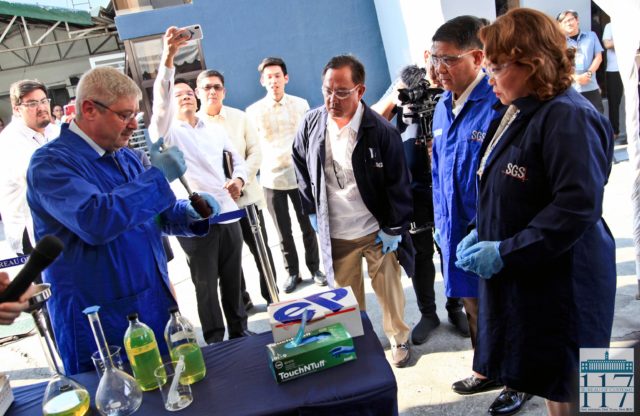
The Philippine Bureau of Customs (BOC) projects additional revenues of P27 billion this year as it officially launched its fuel marking program, which starts nationwide implementation in March.
Customs Commissioner Rey Leonardo Guerrero, Bureau of Internal Revenue (BIR) deputy commissioner Arnel Guballa, and Finance Undersecretary Antonette Tionko on February 6 led the official launching of the program aimed at curbing oil smuggling and plugging revenue losses from illegal importation or misdeclaration of petroleum products.
Marking of such products, whether imported or manufactured in the Philippines, becomes mandatory five years after the Tax Reform for Acceleration and Inclusion (TRAIN) law took effect January 2018.
In a press briefing on February 6, 2019, Guerrero said BOC is on track with implementing the program, with the fuel markers arriving this month and the live implementation nationwide slated for next month.
Asked when the order to implement the program will be issued, Guerrero said they are just waiting for the approval of BOC’s mother agency, the Department of Finance (DOF), which is reviewing the master plan for the program.
In a text message to Asia Customs & Trade, Guerrero said that under the master plan, three types of fuel—diesel, gasoline, and kerosene—will be covered.
“All imports on these three will be marked, starting with areas where consumption is high,” he said, adding that implementation will then gradually spread nationwide in four to six weeks.
Guerrero also noted that the program’s service provider has guaranteed that the fuel markers cannot be copied or imitated, and that its distribution will be strictly monitored.
There will also be random and mandatory checks on gasoline stations and oil depots.
The joint venture of Swiss-based SICPA SA and SGS Philippines, which won the bidding, will implement the fuel marking system.
Under TRAIN, petroleum products that are refined, manufactured, or imported into the Philippines, such as gasoline, denatured alcohol used for motive power, kerosene, and diesel fuel oil, and that are subject to duties and taxes are required to undergo fuel marking after these charges have been paid.
The system will also monitor all locally refined finished oil products to ensure correct payment of corresponding excise taxes and value-added tax.
“All costs pertaining to the procurement of the official fuel markers shall be borne by the refiner, manufacturer or importer of petroleum products as the case may be,” the law says.
It further states that the government may subsidize the cost of official fuel markers in the first year of implementation.
Under the contract, SICPA and SGS shall establish and operate a fuel marking system that will supply and inject fuel markers on all taxable fuel products except Jet A-1, Avgas, crude oil, and liquefied petroleum gas.
It will also implement and manage a nationwide fuel testing program, including fuel analysis and data management, and provide the training to ensure the transfer of technology to BOC and BIR.
DOF earlier estimated revenue losses of P26.87 billion (about US$565.68 million) from smuggled or misdeclared fuel in 2016 alone.
The Asian Development Bank pegged the losses at a higher figure of P37.5 billion annually, while a study commissioned by the local oil industry placed them at an even higher P43.8 billion per year.
The Institute for Development and Econometric Analysis calculated that smuggled gasoline accounted for an average of 23% of gasoline consumption from 2000 to 2006, while smuggled diesel accounted for an average of 6%. – Roumina Pablo








